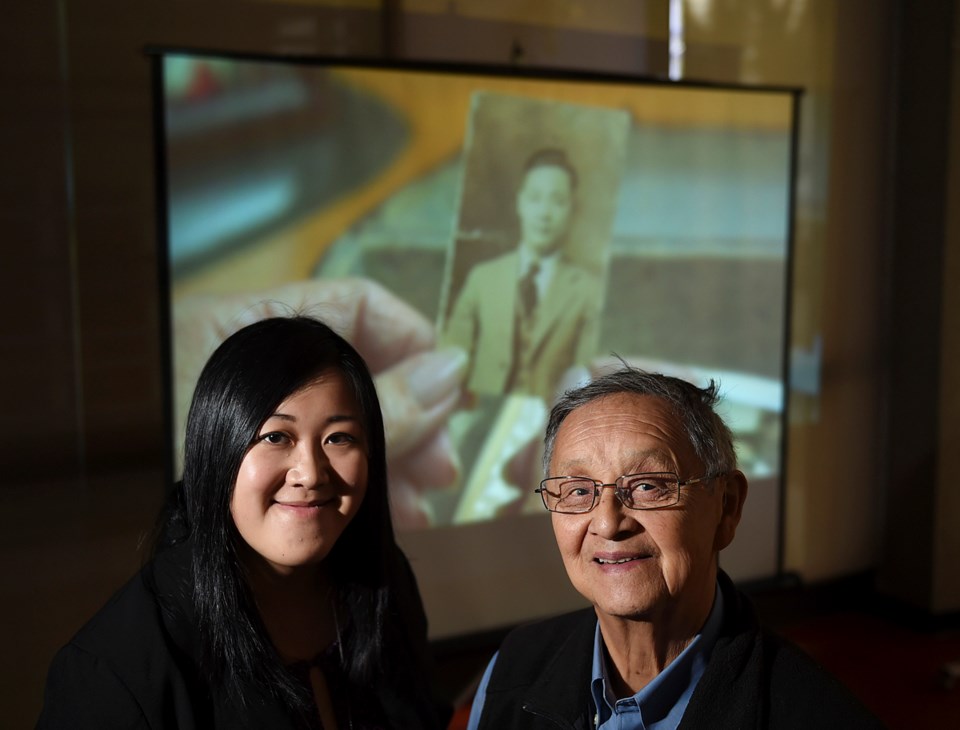Surrounded by total strangers in a tiny village in southern China, Larry Grant experienced a pivotal, if not uniquely bizarre, moment that instantly tied to him a past generation.
It was November 2013, and Grant was flanked by three of his siblings and a documentary film crew tasked with travelling to the family patriarch’s place of birth.
Strangers on the surface, some of those Chinese villagers who greeted the Vancouver group turned out to be blood relatives.
“They were feeding us and introducing us to cousins, nephews and nieces that we had never met when along comes an uncle I didn’t know that I had,” Grant recalled. “I was taken aback. Holy smokes. He was a spitting image of an uncle that had come to Canada and lived for 20-plus years here before his death. Here was this guy who looked like he stepped out of the grave. It was unbelievable.”
The re-unification process that played out is a central theme to the film All Our Father’s Relations, which screens in Vancouver on Jan. 28 at the Goldcorp Centre for the Arts to coincide with the Chinese New Year.
The film follows the interconnected histories, relationships and hardships experienced by both Chinese- Canadian immigrants and First Nations from across Metro Vancouver.
The Grant family’s story is a microcosm of those experiences and stories. Grant’s father, Hong Tim Hing, left the village of Sei Moon and moved to Vancouver in 1920. He worked on farmland located on Musqueam territory, and eventually married Agnes Grant, who was of Musqueam descent.
Government legislation of the day, however, prohibited the couple from living together on the reserve; Hing was forced to live apart from the rest of the family. Even though his parents were married, Grant likened his upbringing to being raised in a single-parent home.
Barriers upon barriers targeting Chinese-Canadians and indigenous populations are featured throughout the film: the Indian Act, residential schools, the banning of potlatchs and the Chinese Head Tax, among others.
The film calls attention to those past wrongs, but also highlights the resilience required to live through those experiences.
“All of those hardships that were endured by our ancestors, of not having parity, equality and equity in society — I would like the viewers to have a better understanding of that,” said Grant, who’s now 80 and still living on the main Musqueam reserve in South Vancouver. “A lot of things were said and done. But you just did your best. I just kept pushing and pushing.”
Grant graduated from high school in 1955 and went on to a career as an auto machinist and heavy duty mechanic in the longshore industry. He now works at UBC in the First Nations and Endangered Languages Program, to help keep the Musqueam language alive.
It was at UBC that Grant first crossed paths with Sarah Ling, a history student and fledgling documentary filmmaker at the time. Their initial collaboration was a trilingual children’s book based on Grant’s life that was published in English, Chinese and the Musqueam language, hən'q'əmin'əm.’
The plan to hatch the film was then born in 2013, shortly before the Grants left for China. In her role as producer, Ling helped family members tell their story and lined up the logistics of the filming and editing process.
Along with director Alejandro Yoshizawa, Ling witnessed first-hand the reunification of families once separated by more than 10,000 kilometres.
“It was really profound — when they first saw their uncle and embraced him, I think it was hard for them to speak,” she said. “You could see so many memories flooding back. I felt really privileged to be there.”
The Grants were in Sei Moon for less than 48 hours. Documenting the trip, bridging the cultural gap and establishing communication — they had three translators along — was pivotal. A journal written in Cantonese was shown to Grant that traced centuries of his father’s roots in China.
“I was told, ‘You are the 17th generation of this house.’ Oh my God. That was my reaction,” he said. “Going there and being hugged and fed, it’s not just something in a book at that point. To be embraced and hear someone say, ‘This is where you belong, this is where you come from’ was very emotional.” Tickets for All Our Father’s Relations are available online only and cost $15. The screening kicks off at 6:30 p.m. at the Goldcorp Centre for the Arts. Ticket info is available online at eventbrite.ca.



